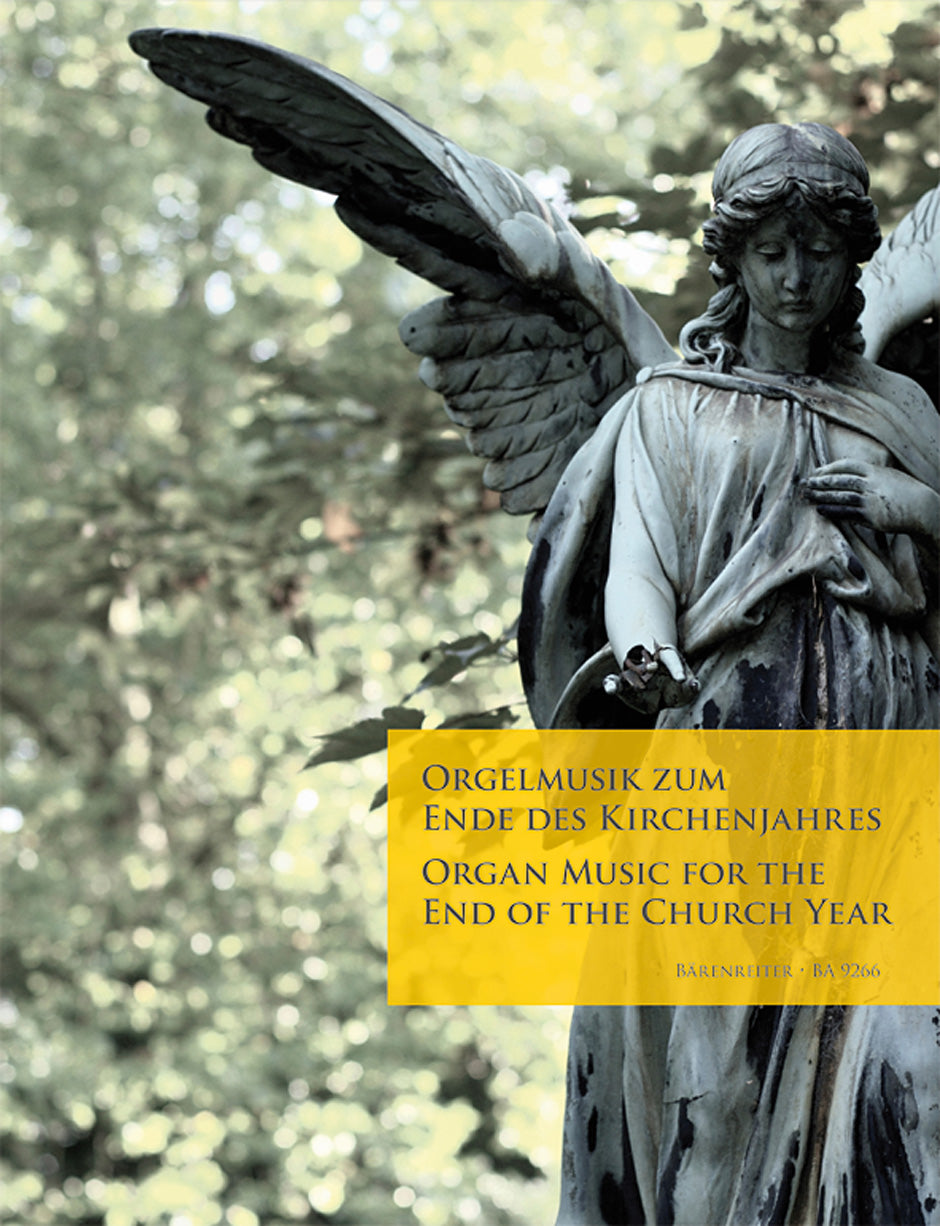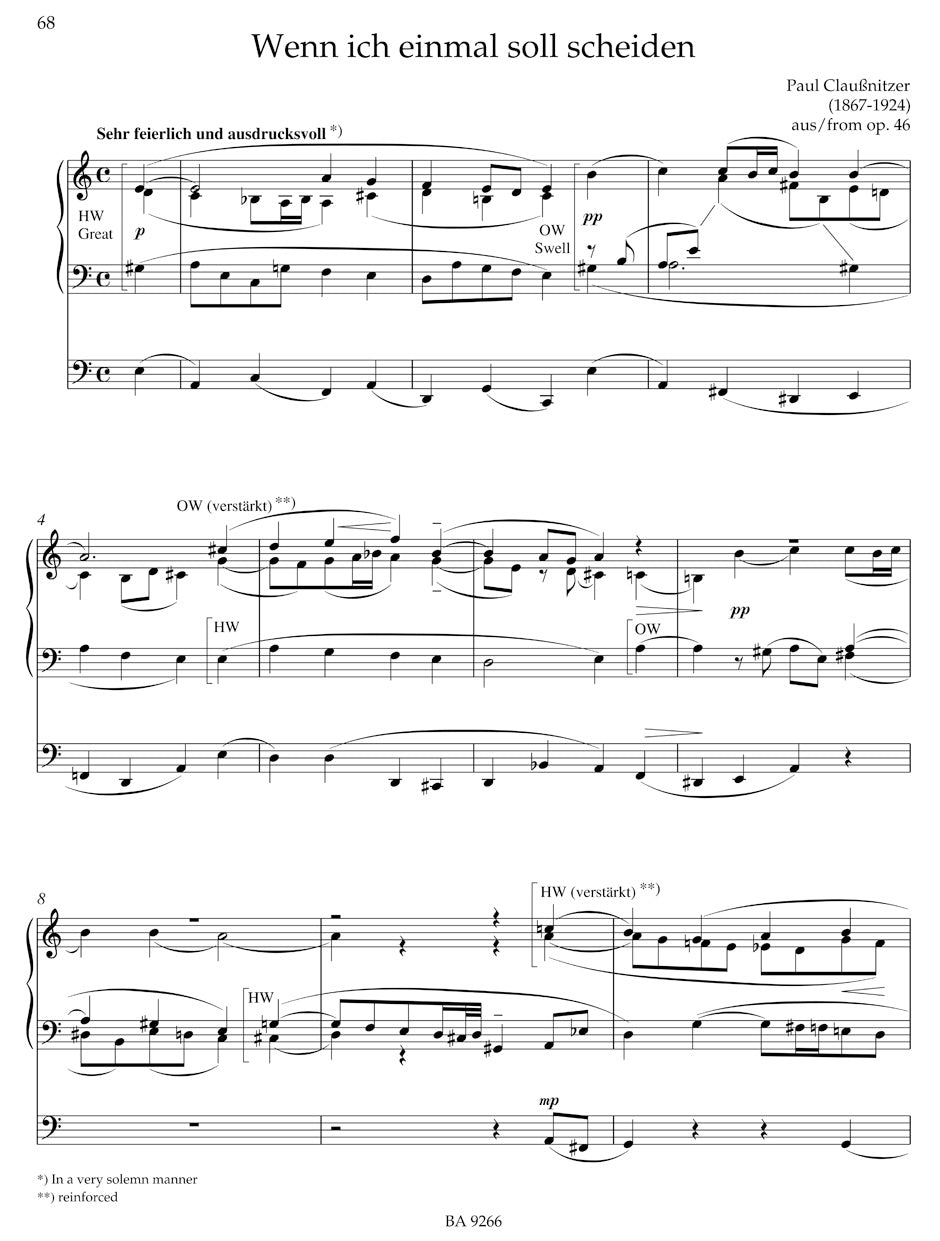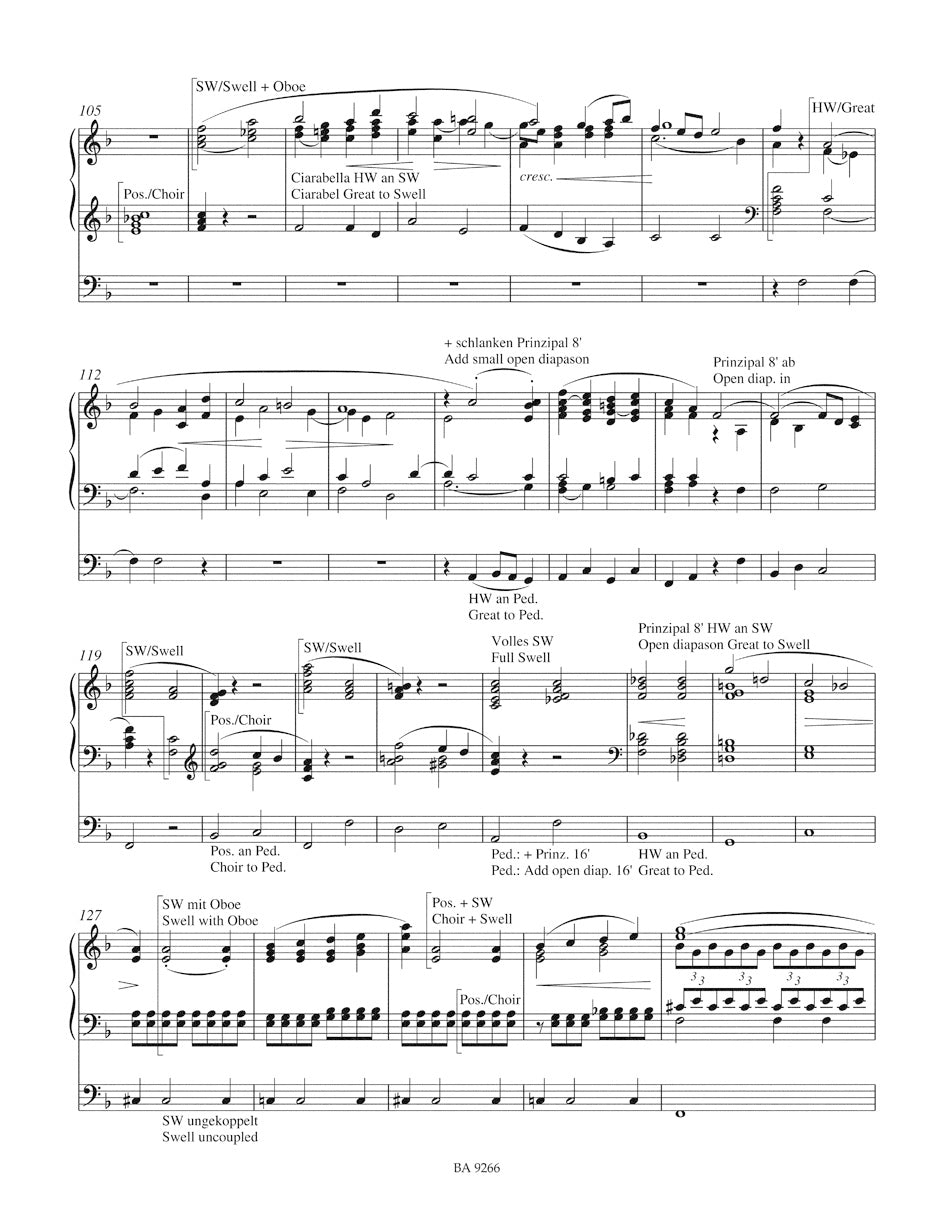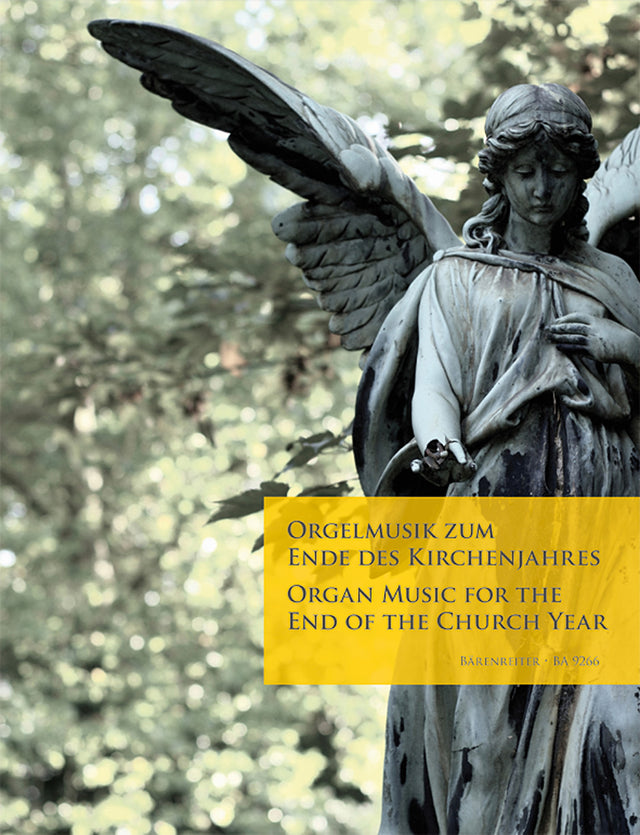Organ Music for the End of the Church Year
In stock and typically ships within 1 business day.
- Composers: Paul Blumenthal, Uso Seifert, Max Gulbins (1862-1932), Otto Dienel (1839-1905), Robert Frenzel (1850-1928), Theophil Forchhammer (1847-1923), Johannes Brahms (1833-1897), Frédéric Chopin (1810-1849), Johannes Weyhmann (1887-1931), Paul Claußnitzer (1867-1924), Emil Weidenhagen (1862-1922), Rudolph Siebenbrodt, Philipp Wolfrum, Wilhelm Teschner, Alfred Schilling, Alfred Grundmann (1857-1930), Heinrich Lang
- ISMN:
- Size: 9.1 x 11.8 inches
- Pages: 84
Description
This collection presents pieces for the end of the church year, particularly repertoire from the 19th century which can also be played at funerals. It has been conceived for use in all church denominations and targets professional as well as non-professional church musicians.
The collection also contains an index, short biographical notes in two languages (Ger/Eng) and a detailed foreword.
Contents
End of the Church Year: Chorale preludes by Theophil Forchhammer, Paul Claußnitzer a. o., and an arrangement from the German Requiem by Johannes Brahms
Fear and Trust: Johannes Weyhmann, "Klage", Op. 12,4; Wilhelm Teschner, Charakterstück "Klage und Trost", Op. 51; Franciscus Nagler, two chorale preludes on "So nimm denn meine Hände" as well as other chorale preludes
Death and Eternal Life: Arrangement of the prelude, Op. 99,4 by Robert Schumann; Max Gulbins, "Totenfest"; Max Gulbins, festive fantasia on "Wenn ich einmal soll scheiden"; Uso Seifert, "Trauerzug", Op. 42; Paul Blumenthal, festive prelude on "Jesus, meine Zuversicht"; Johannes Weyhmann, "Memento mori", Op. 12,8 and other preludes, figurations, organ pieces on appropriate well-known chorales; chorale preludes on "O Welt, ich muss dich lassen" by Ernst Schnorr von Carolsfeld, Paul Claußnitzer, Philipp Wolfrum a. o.
Forchhammer, Theophil Chorale prelude on "Es ist gewißlich an der Zeit", Op. 37
Claußnitzer, Paul Chorale prelude on "Es ist gewißlich an der Zeit"
Weyhmann, Johannes Chorale prelude on "Jerusalem, du hochgebaute Stadt"
Weidenhagen, Emil Chorale fantasia on "Jerusalem, du hochgebaute Stadt"
Brahms, Johannes Arranger: Phillips, J. W. From the Requiem: "Blessed are they that mourn" Arranged for organ by J. W. Phillips
Weyhmann, Johannes Chorale prelude on "Wachet auf, ruft uns die Stimme" "Wake, O wake! with tidings thrilling"
Siebenbrodt, Rudolph Chorale prelude on "Wachet auf, ruft uns die Stimme" "Wake, O wake! with tidings thrilling"
Weyhmann, Johannes Lament, Op. 12,4
Weyhmann, Johannes Chorale prelude on "Ach Herr, laß dein lieb' Engelein", Op. 23 Concluding verse from "Herzlich lieb hab ich dich, o Herr"
Wolfrum, Philipp Chorale prelude on "Herr, wie du willst, so schick's mit mir", Op. 27 "Lord, as Thou wilt, so deal with me"
Teschner, Wilhelm Character piece "Lament and Consolation", Op. 51 Instrumentation: Barner, Andreas Chorale prelude on "Ich bete an die Macht der Liebe"
Schilling, Alfred Chorale prelude on "So nimm denn meine Hände", Op. 12
Weyhmann, Johannes Chorale prelude on "Was Gott tut, das ist wohlgetan" "What God doth, only that is right"
Gulbins, Max Remebrance ceremony, Op. 73,9 chorale "Christus, der ist mein Leben" - "Since Christ doth own my being"
Grundmann, Alfred Chorale prelude on "Christus, der ist mein Leben" "Since Christ doth own my being"
Lang, Heinrich Chorale prelude on "Freu dich sehr, o meine Seele"
Weyhmann, Johannes Memento mori, Op. 12,8
Blumenthal, Paul Chorale prelude on "Jesus, meine Zuversicht", Op. 89,4 "Ratisbon"
Dienel, Otto Funeral march on the chorale "Jesus, meine Zuversicht", Op. 12 "Ratisbon"
Wolfrum, Philipp Chorale prelude on "O Ewigkeit, du Donnerwort", Op. 27 "Eternity, tremendous word"
Wolfrum, Philipp Chorale prelude on "O Welt, ich muß dich lassen", Op. 27
Chopin, Frédéric Gottschalg, Alexander Wilhelm Funeral march, Op. 23 Arranged for organ by Alexander Wilhelm Gottschalg
Wolfrum, Philipp Chorale prelude on "Valet will ich dir geben", Op. 27
Gulbins, Max Funeral procession, Op. 17,2
Claußnitzer, Paul Chorale prelude on "Wenn ich einmal soll scheiden" - "My days are few, O fail not", Op. 46 verse from "O Haupt voll Blut und Wunden" - "O sacred head, sore wounded"
Gulbins, Max Festival fantasia on "Wenn ich einmal soll scheiden" - "My days are few, O fail not", Op. 105,1 verse from "O Haupt voll Blut und Wunden" - "O sacred head, sore wounded"
Seifert, Uso Funeral procession, Op. 42
Forchhammer, Theophil Chorale prelude on "Wer weiß, wie nahe mir mein Ende", Op. 37
Frenzel, Robert Chorale prelude on "Wer weiß, wie nahe mir mein Ende", Op. 6
Publishers use a lot of words to describe what they sell, and we know it can be confusing. We've tried to be as clear as possible to make sure you get exactly what you are looking for. Below are descriptions of the terms that we use to describe the various formats that music often comes in.
Choral Score
A score for vocalists that only contains the vocal lines. The instrumental parts are not there for reference. Generally, cheaper than a vocal score and requires multiple copies for purchase.
Facsimile
Reproductions of the original hand-written scores from the composer.
Full Score
For ensemble music, this indicates that the edition contains all parts on a single system (there are not separate parts for each player). In larger ensembles, this is for the conductor.
Hardcover
Hardbound. Generally either linen-covered or half-leather.
Orchestral Parts
Similar to a wind set, this is a collection of parts. In the case of strings, the numbers listed are the number of copies included, though generally these are available individually (often with minimum quantities required).
Paperback
When publishers offer multiple bindings (e.g. hardcover) or study scores, this is the "standard" version. If you're planning to play the music, this is probably what you want.
Performance / Playing Score
A score of the music containing all parts on one system, intended for players to share. There are not separate parts for each player.
Set of Parts
For ensemble music, this indicates that there are separate individual parts for each player.
Solo Part with Piano Reduction
For solo pieces with orchestra, this is a version that contains a piano reduction of the orchestra parts. For piano pieces, two copies are typically needed for performance.
Study Score
A small (think choral size) copy of the complete score meant for studying, and not playing. They make great add-ons when learning concertos and small chamber works.
Vocal Score
A score prepared for vocalists that includes the piano/organ part or a reduction of the instrumental parts.
Wind Set
For orchestral music, this is a collection of wind and percussion parts. The specific quantities of each instrument are notated.
With Audio
In addition to the printed music, the edition contains recordings of the pieces. This may be an included CD, or access to files on the internet.
With / Without Fingering (Markings)
Some publishers prepare two copies - a pure Urtext edition that includes no fingering (or bowing) suggestions and a lightly edited version that includes a minimal number of editorial markings.





